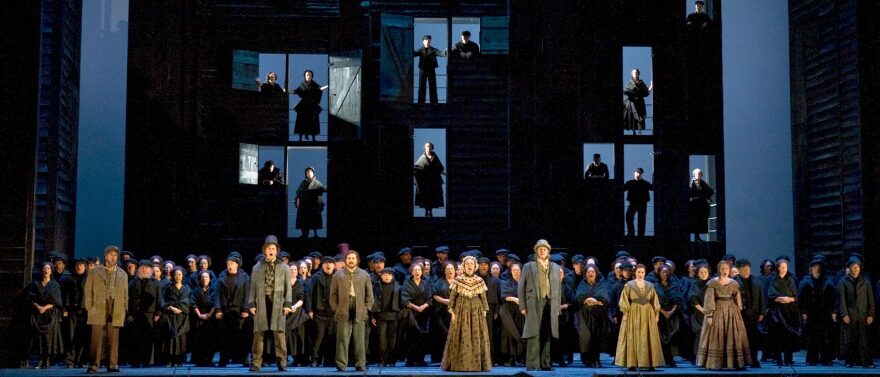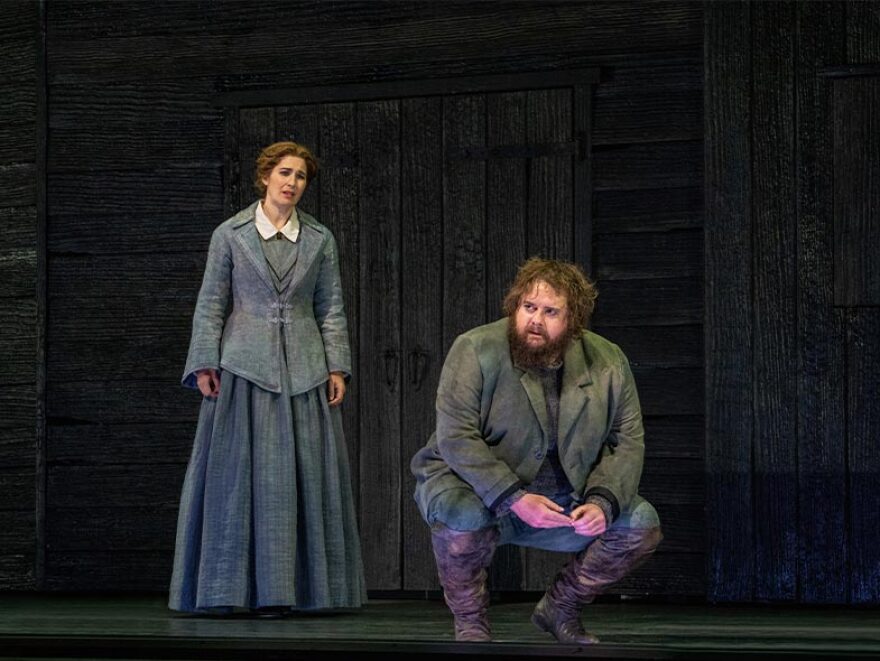BREAKING NEWS: Mad Suffolk Fisherman’s Body Found Along the Shore
Reports are coming in from Suffolk that the body of ostracized fisherman Peter Grimes was found along the shore. His death was ruled a drowning. Several weeks ago, Grimes was found innocent for the murder of his apprentice, but that did not allay the suspicions of local townspeople, who grew against him, possibly triggering his mental health decline. The whereabouts of Grimes’ most recent apprentice are unknown, although his belongings were found in Grimes’ hut. The investigation continues.
That could be the teaser for a television news story about Benjamin Britten’s 1945 opera Peter Grimes. Not only is the storytelling among the most gripping in the operatic canon, but the spectacular use of all its forces — like the stunning and haunting Four Sea Interludes, powerfully intense use of the chorus, and an array of wonderfully musico-dramatically defined characters — make Peter Grimes one of the greatest operas ever written. It returns to the Toll Brothers-Metropolitan Opera International Radio Network for the first time since 2008, this Saturday, April 29 at 1:00 p.m. on WRTI 90.1 FM and at wrti.org.
With its masterly orchestration, deft attention to details, and virtually perfect dramatic arc, Peter Grimes doesn’t feel at all like the work of a first-timer. Which makes it all the more extraordinary to consider that this was Britten’s first major operatic work. His only other stage experience was the 1941 operetta Paul Bunyan, which premiered at Columbia University. What Britten had was years of experience composing soundtracks to documentaries for the BBC, honing his skills to compose music for every conceivable dramatic situation.
Peter Grimes was also the first opera by a British composer to enter the international canon since Henry Purcell’s Dido and Aeneas in 1689. While opera composition in Great Britain certainly wasn’t dormant all those years, works by Thomas Arne, Arthur Sullivan and Frederick Deilius (to name but a few) never really caught on broadly. Peter Grimes ushered in the rebirth of English opera.

While living in America with his musical and romantic partner Peter Peters, Britten discovered George Crabbe’s 1810 narrative poem, ‘The Borough,’ in a bookstore. The poem is set in Suffolk and written as a series of 24 letters, the 22nd of which tells the story of Peter Grimes, a fisherman suspected of murdering three apprentices, who ultimately falls into madness. Britten and Pears were not only compelled by the story, but having been away from the UK for several years, its Suffolk setting filled the void created from homesickness.
In addition to having been set in Britten’s hometown, the theme of the outsider hit close to home. Britten and Pears had been ostracized by elements of society for their sexual orientation and for having left Britain as conscientious objectors; in 1939 they had moved to America to escape the beginning of the Second World War. Britten’s dedicated pacifism influenced his compositions throughout his career, in later works such as the War Requiem (1962).
Peter Grimes nearly had its world premiere in America. Serge Koussevitsky commissioned an opera from Britten with the intention of premiering it at the Tanglewood Festival. But he acquiesced to Britten’s request for the premiere to take place in London: the 1945 premiere at Sadler’s Wells was a major success, and other productions were soon scheduled throughout Europe within weeks of the premiere. The following year it did make its way to Tanglewood, with Leonard Bernstein conducting.
Beyond the vocal and dramatic challenges of the role, at his core Peter Grimes wants to be accepted by the community, and to restore his reputation. At the beginning of the opera we find him on trial for the murder of his apprentice, who died from exposure to the elements when they were lost at sea. Although Grimes was acquitted of any wrongdoing, the townspeople still view him as guilty, deriding him both privately and publicly. When he has the first moment to be his true self while with schoolmistress Ellen Orford, the closest of his few allies, his first words are: “The truth – the pity – and the truth.” For the remainder of the work, his sole goal is to share his truth and restore his reputation. That desire for “the truth” to be widely known permeates the work, but with Grimes’ suicide and madness, resulting from the borough’s hate poisoning his own mind, only the gossip and speculation survive. (I speak more about the mix of emotional turmoil in the opera on this episode of The Metropolitan Opera Guild podcast.)
The title character’s societal and emotional decline calls for a great singing actor to portray the role. Since Peter Pears’ legendary portrayal in the world premiere, the title character has been played by Jon Vickers, Philip Langridge, Ben Heppner, and Neil Shicoff, among others. In this production, from The Met Opera’s 2022-23 season, acclaimed tenor Allan Clayton assumes the role. Clayton made an historic debut at The Met last season in the fiendishly difficult title role of Brett Dean’s Hamlet, winning unanimous acclaim for his singing as well as acting. Reviewing him in Peter Grimes, the New York Times’ Joshua Barone hailed Clayton as a star.
Joining Clayton in the cast are Australian soprano Nicole Car as Ellen Orford, Adam Plachetka as his ally Captain Balstrode, and legendary mezzo-soprano Denyce Graves in the role of Auntie.
Tune in this Saturday, April 29 for the gripping and devastating tale of Peter Grimes. 1:00 p.m. on WRTI 90.1 FM and streaming at wrti.org.


